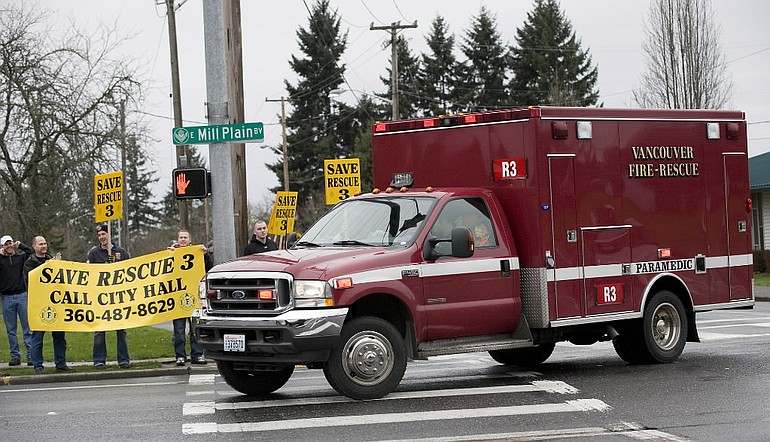With emergency response times still below city standards, Vancouver Fire paramedics and trucks may stop responding to the lowest-priority medical calls, Chief Don Bivins told the Vancouver City Council Monday.
As soon as this summer, Vancouver paramedics would no longer go to the 4,000 non-emergency calls that are part of the nearly 19,000 medical calls the department receives every year, Bivins said. American Medical Response, the private company that contracts with the city for secondary response and transport to a hospital, would still go to those calls, he said.
“I can’t justify having a unit out of service on a non-emergent situation, and have an emergent situation happen,” said Bivins, who has already seen the loss of his department’s last medical rescue unit due to city budget cuts.
Paramedics arrive at 71 percent of medical calls in Vancouver’s urban area within five minutes or less, well below the department’s goal for a five minute response 90 percent of the time, Bivins explained during a snapshot of his department’s performance to the council.
VFD spends an average of 19 minutes at each call, so cutting those 4,000 trips would free up firefighters for more urgent matters, Bivins said. About 56 percent of calls VFD gets are time critical, like cardiac arrest, stroke or traumatic injuries.
Examples of non-emergency calls include hip, leg and arm fractures; emergency reactions where someone is not having difficulty breathing; and possible miscarriages in women who are 20 weeks pregnant or less.
“There are some examples that are ridiculous, others that are surprising because they’re not actually time-critical,” the chief said. “We’ve had someone call 911 to say ‘My rectum hurts.’”
Union President Mark Johnston said firefighters voted unanimously at their last meeting to oppose the change.
“It’s a very ill considered idea — it doesn’t save any money and people are going to be harmed,” Johnston said. “This could cause serious harm to people. Response times are going to be way too long.”
AMR is contracted with the city to respond to calls within 8 minutes or less, but like the city paramedics, is also facing its own struggles to meet that standard.
That the move has drawn the concern of the city’s firefighter’s union is “for all the right reasons,” Bivins conceded.
“They truly want to provide service to all who think they need it,” he said. “Unfortunately we care more than we can afford.”
At this point it’s up to City Manager Pat McDonnell to decide if the decision to cease responding to these calls must be approved by the city council as a policy decision, he said.
Johnston said that non-native English speakers or someone who is having a stroke could be difficult to understand and could cause a call to be miscategorized.
“It would be terrible to not go on a call that could be serious or is serious,” he said.
The union leader also said he thinks the change would shift more of the burden on AMR: “It would impact their business and ability to provide service. It’s ill conceived all around.”
Bivins said that about 3 percent of calls that come in as low-priority wind up being more serious medical situations, and that VFD would still be available to assist AMR with those calls.
AMR responds to and transports about 85 percent of those 4,000 calls already, Bivins said, meaning the change amounts to an extra 600 trips for them a year.
The change would be an extension of a policy that’s been in place for a few years, where Vancouver fire does not respond to similar calls at senior and other care facilities. There’s no indication that any negative impacts have come from an AMR-only response, he said.



